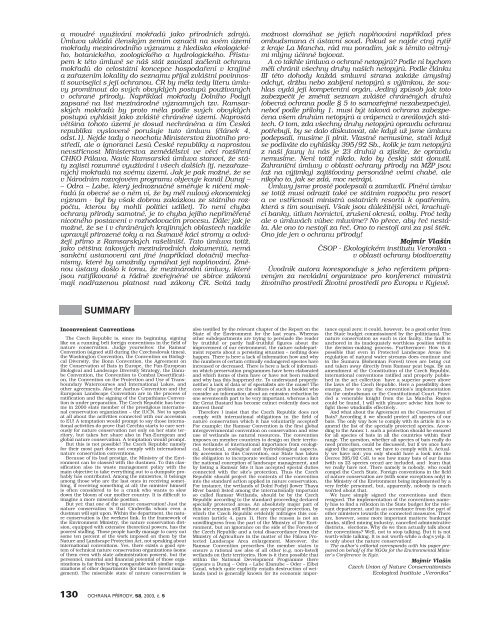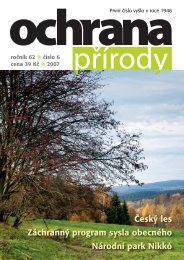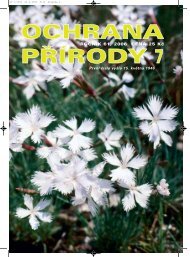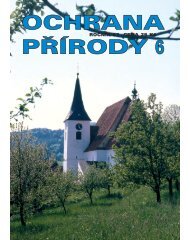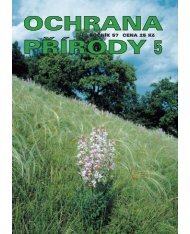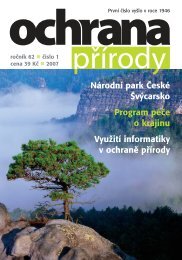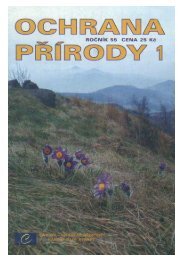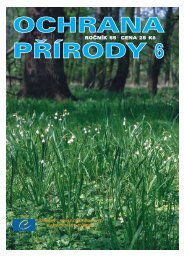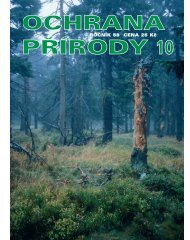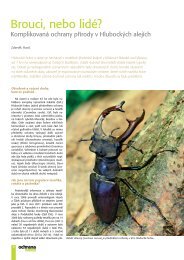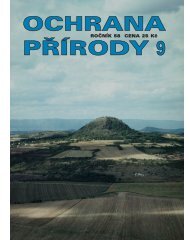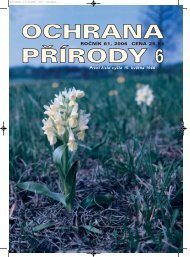You also want an ePaper? Increase the reach of your titles
YUMPU automatically turns print PDFs into web optimized ePapers that Google loves.
a moudré vyuÏívání mokfiadÛ jako pfiírodních zdrojÛ.<br />
Úmluva ukládá ãlensk˘m zemím oznaãit na svém území<br />
mokfiady mezinárodního v˘znamu z hlediska ekologického,<br />
botanického, zoologického a hydrologického. Pfiístupem<br />
k této úmluvû se nበstát zavázal zaãlenit ochranu<br />
mokfiadÛ do celostátní koncepce hospodafiení v krajinû<br />
azafiazením lokality do seznamu pfiijal zvlá‰tní povinnosti<br />
související s její ochranou. âR by mûla tedy literu úmluvy<br />
promítnout do sv˘ch obvykl˘ch postupÛ pouÏívan˘ch<br />
v ochranû pfiírody. Napfiíklad mokfiady Dolního Podyjí<br />
zapsané na list mezinárodnû v˘znamn˘ch tzv. Ramsarsk˘ch<br />
mokfiadÛ by proto mûla podle sv˘ch obvykl˘ch<br />
postupÛ vyhlásit jako zvlá‰tû chránûné území. Naprostá<br />
vût‰ina tohoto území je dosud nechránûna a tím âeská<br />
republika vyslovenû poru‰uje tuto úmluvu (ãlánek 4,<br />
odst.1). Nejde tady o neochotu Ministerstva Ïivotního prostfiedí,<br />
ale o ignoranci LesÛ âeské republiky a naprostou<br />
nevstfiícnost Ministerstva zemûdûlství ve vûci roz‰ífiení<br />
CHKO Pálava. Navíc Ramsarská úmluva stanoví, Ïe státy<br />
zajistí rozumné vyuÏívání i v‰ech dal‰ích (tj. nezafiazen˘ch)<br />
mokfiadÛ na svému území. Jak je pak moÏné, Ïe se<br />
v Národním rozvojovém programu objevuje kanál Dunaj –<br />
– Odra – Labe, kter˘ jednoznaãnû smûfiuje k niãení mokfiadÛ<br />
(a obecnû se o nûm ví, Ïe by mûl nulov˘ ekonomick˘<br />
v˘znam - byl by v‰ak dobrou zakázkou ze státního rozpoãtu,<br />
kterou by mohli politici udílet). To není chyba<br />
ochrany pfiírody samotné, je to chyba jejího nepfiimûfienû<br />
nicotného postavení v rozhodovacím procesu. Dále: jak je<br />
moÏné, Ïe se i v chránûn˘ch krajinn˘ch oblastech nadále<br />
upravují pfiirozené toky a na ·umavû kácí stromy a odvá-<br />
Ïejí pfiímo z Ramsarsk˘ch ra‰elini‰È. Tato úmluva totiÏ,<br />
jako vût‰ina takov˘ch mezinárodních dokumentÛ, nemá<br />
sankãní ustanovení ani jiné (napfiíklad dotaãní) mechanismy,<br />
které by umoÏnily vymáhat její naplÀování. Zmûnou<br />
ústavy do‰lo k tomu, Ïe mezinárodní úmluvy, které<br />
jsou ratifikované a fiádnû zvefiejnûné ve sbírce zákonÛ<br />
mají nadfiazenou platnost nad zákony âR. Svítá tady<br />
moÏnost domáhat se jejich naplÀování napfiíklad pfies<br />
ombudsmana ãi ústavní soud. Pokud se najde ctn˘ rytífi<br />
zkraje La Mancha, rád mu poradím, jak s tûmito vûtrn˘mi<br />
ml˘ny úãinnû bojovat.<br />
A co takhle úmluva o ochranû netop˘rÛ? Podle ní bychom<br />
mûli chránit v‰echny druhy na‰ich netop˘rÛ. Podle ãlánku<br />
III této dohody kaÏdá smluvní strana zakáÏe úmysln˘<br />
odchyt, drÏbu nebo zabíjení netop˘rÛ s v˘jimkou, Ïe souhlas<br />
vydá její kompetentní orgán. Jedin˘ zpÛsob jak toto<br />
zabezpeãit je zmûnit seznam zvlá‰tû chránûn˘ch druhÛ<br />
(obecná ochrana podle § 5 to samozfiejmû nezabezpeãuje),<br />
neboÈ podle pfiílohy 1. musí b˘t taková ochrana zabezpeãena<br />
v‰em druhÛm netop˘rÛ a vrápencÛ v areálov˘ch státech.<br />
O tom, zda v‰echny druhy netop˘rÛ opravdu ochranu<br />
potfiebují, by se dalo diskutovat, ale kdyÏ uÏ jsme úmluvu<br />
podepsali, musíme ji plnit. Vlastnû nemusíme, staãí kdyÏ<br />
se podíváte do vyhlá‰ky 395/92 Sb., kolik je tam netop˘rÛ<br />
z na‰í fauny (u nás je 23 druhÛ) a zjistíte, Ïe opravdu<br />
nemusíme. Není totiÏ nikdo, kdo by ãesk˘ stát donutil.<br />
Zahraniãní úmluvy v oblasti ochrany pfiírody na MÎP jsou<br />
(aÏ na v˘jimky) zaji‰Èovány personálnû velmi chabû, ale<br />
nikoho to, jak se zdá, moc netrápí.<br />
Úmluvy jsme prostû podepsali a zamluvili. Plnûní úmluv<br />
se totiÏ musí odrazit také ve státním rozpoãtu pro resort<br />
avevstfiícnosti ministrÛ ostatních resortÛ k opatfiením,<br />
která s tím souvisejí. V‰ak jsou dÛleÏitûj‰í vûci, krachující<br />
banky, útlum hornictví, zru‰ení okresÛ, volby. Proã tedy<br />
ale o úmluvách vÛbec mluvíme? No pfiece, aby fieã nestála.<br />
Ale ono to nestojí za fieã. Ono to nestojí ani za psí ‰tûk.<br />
Ono jde jen o ochranu pfiírody!<br />
Mojmír Vla‰ín<br />
âSOP - Ekologickém institutu Veronika -<br />
voblasti ochrany biodiverzity<br />
Úvodník autora koresponduje s jeho referátem pfiipraven˘m<br />
za nevládní organizace pro konferenci ministrÛ<br />
Ïivotního prostfiedí Îivotní prostfiedí pro Evropu v Kyjevû.<br />
SUMMARY<br />
Inconvenient Conventions<br />
The Czech Republic is, since its beginning, signing<br />
like on a running belt foreign conventions in the field of<br />
nature conservation. Judge yourselves: the Ramsar<br />
Convention (signed still during the Czechoslovak times),<br />
the Washington Convention, the Convention on Biological<br />
Diversity, the Bonn Convention, the Agreement on<br />
the Conservation of Bats in Europe, the Pan-European<br />
Biological and Landscape Diversity Strategy, the Danube<br />
Convention, the Convention to Combat Desertification,<br />
the Convention on the Protection and Use of Transboundary<br />
Watercourses and International Lakes, and<br />
other agreements. Also the Aarhus Convention and the<br />
European Landscape Convention are in the process of<br />
ratification and the signing of the Carpathians Convention<br />
is under preparation. The Czech Republic has become<br />
in 2000 state member of the prestigious international<br />
conservation organization – the IUCN. Not to speak<br />
at all about the activities connected with our accession<br />
to EU! A temptation would prompt to say those international<br />
activities do prove that Czechia starts to care seriously<br />
for nature conservation not only on her state territory,<br />
but takes her share also in Pan-European and<br />
global nature conservation. A temptation would prompt.<br />
But this is not possible! The Czech Republic namely<br />
for their most part does not comply with international<br />
nature conservation conventions.<br />
Because of its bad prestige, the Ministry of the Environment<br />
can be classed with the dustmen. To this classification<br />
also its waste management policy with the<br />
main objective to take everything out to a dumpsite probably<br />
has contributed. Among the ministries, it belongs<br />
among those who are the last ones in receiving something,<br />
if receiving something at all; the minister himself<br />
is often considered to be a crank who wants to slow<br />
down the bloom of our mother country. It is difficult to<br />
imagine a more miserable position.<br />
But yet: that one of the nature conservation! Just the<br />
nature conservation is that Cinderella whom even a<br />
dustman will spit upon. Within the department, the nature<br />
conservation is the weekest link. In the framework of<br />
the Environment Ministry, the nature conservation division,<br />
equipped with extensive theoretical powers, has the<br />
poorest staffing. Those people hardly manage to carry out<br />
some ten percent of the work imposed on them by the<br />
Nature and Landscape Protection Act, not speaking about<br />
international conventions. Yes, there exists a good system<br />
of technical nature conservation organizations (some<br />
of them even with state administration powers), but the<br />
personnel, material and financial potential of those organizations<br />
is far from being comparable with similar organizations<br />
of other departments (for instance forest management).<br />
The miserable state of nature conservation is<br />
also testified by the relevant chapter of the Report on the<br />
State of the Environment for the last years. Whereas<br />
other subdepartments are trying to persuade the reader<br />
by truthful or partly half-truthful figures about the<br />
improvement of our environment, the nature subdepartment<br />
reports about a persisting situation – nothing does<br />
happen. There is here a lack of information how and why<br />
the numbers of certain critically endangered species have<br />
increased or decreased. There is here a lack of information<br />
which preservation programmes have been elaborated<br />
and which items of them have or have not been realized<br />
and why has this happened etc. To understand properly:<br />
neither a lack of data or of specialists are the cause! The<br />
core of the problem are the editors of such a booklet who<br />
consider an information about an emission reduction by<br />
one seventeenth part to be very important, whereas a fact<br />
the Great Bustard has become extinct evidently does not<br />
interest them!<br />
Therefore I insist that the Czech Republic does not<br />
comply with international obligations in the field of<br />
nature conservation which it has voluntarily accepted!<br />
For example: the Ramsar Convention is the first global<br />
intergovernmental convention on conservation and wise<br />
use of wetlands as natural resources. The convention<br />
imposes on member countries to design on their territories<br />
wetlands of international importance from ecological,<br />
botanical, zoological and hydrobiological aspects.<br />
By accession to this Convention, our State has taken<br />
the obligation to incorporate wetland conservation into<br />
the national conception of landscape management, and<br />
by listing a Ramsar Site it has accepted special duties<br />
connected with the site’s protection. Thus the Czech<br />
Republic should project the contents of the convention<br />
into the standard action applied in nature conservation.<br />
For instance, the wetlands of Dolní Podyjí (lower Thaya<br />
River basin) listed among the internationally important<br />
so called Ramsar Wetlands, should be by the Czech<br />
Republic according to the standard proceeding declared<br />
specially protected areas. An absolutely major part of<br />
this site remains still without any special protection, by<br />
which the Czech Republic evidently infringes this convention<br />
(article 4, para 1). Here the reason is not an<br />
unwillingness from the part of the Ministry of the Environment,<br />
but an ignorance on the side of the Forests of<br />
the Czech Republic and a total disaccordance from the<br />
Ministry of Agriculture in the matter of the Pálava Protected<br />
Landscape Area enlargement. Moreover, the<br />
Ramsar Convention prescribes the member states to<br />
ensure a rational use also of all other (e.g. non-listed)<br />
wetlands on their territories. How is it then possible that<br />
within the National Development Programme there<br />
appears a Dunaj – Odra – Labe (Danube – Oder – Elbe)<br />
Canal, which quite explicitly entails destruction of wetlands<br />
(and is generally known for its economic importance<br />
equal zero; it could, however, be a good order from<br />
the State budget commissioned by the politicians). The<br />
nature conservation as such is not faulty, the fault is<br />
anchored in its inadequately worthless position within<br />
the decision-making process. Furthermore: How is it<br />
possible that even in Protected Landscape Areas the<br />
regulation of natural water streams does continue and<br />
in the ·umava (Bohemian Forest) trees are being cut<br />
and taken away directly from Ramsar peat bogs. By an<br />
amendment of the Constitution of the Czech Republic,<br />
international conventions ratified and properly published<br />
in the act collection have a superior power above<br />
the laws of the Czech Republic. Here a possibility does<br />
emerge, how to urge the convention’s implementation<br />
via the ombudsman or the Constitutional Court. Provided<br />
a venerable knight from the La Mancha Region<br />
could be found, I will with pleasure advise him how to<br />
fight these windmills effectively.<br />
And what about the Agreement on the Conservation of<br />
Bats? According it we should protect all species of our<br />
bats. The only way how to comply with its article iii is to<br />
amend the list of the specially protected species. According<br />
to the Annex 1. such a protection should be ensured<br />
for all species of bats in all the countries within their<br />
range. The question, whether all species of bats really do<br />
need protection, could be discussed, but if we once have<br />
signed the agreement, we have to comply with it. Actually<br />
we have not: you only should have a look into the<br />
Decree 395/92 Coll. to see how many bats of our fauna<br />
(with us 23 species occur) are included, and learn that<br />
we really have not. There namely is nobody, who could<br />
compel the Czech State. Foreign conventions in the field<br />
of nature conservation are (with some exceptions only) in<br />
the Ministry of the Environment being implemented by a<br />
very feeble personnel, but, apparently, nobody is much<br />
worried about that.<br />
We have simply signed the conventions and then<br />
resigned. The implementation of the conventions namely<br />
has to find a reflexion in the State budget for the relevant<br />
department, and in an accordance from the part of<br />
other ministers towards the connected measures. There<br />
are, however, some more important matters: bankrupt<br />
banks, stifled mining industry, cancelled administrative<br />
districts, elections. Why do we then actually talk about<br />
the conventions? Well, not to stop talking. But it is not<br />
worth-while talking. It is not worth-while a dog’s yelp. It<br />
is only about the nature conservation!<br />
The author’s editorial corresponds with his paper prepared<br />
on behalf of the NGOs for the Environmental Minister’s<br />
Conference in Kyiv.<br />
Mojmír Vla‰ín<br />
Czech Union of Nature Conservationists<br />
Ecological Institute „Veronika“<br />
130 OCHRANA P¤ÍRODY, 58, <strong>2003</strong>, ã. 5


